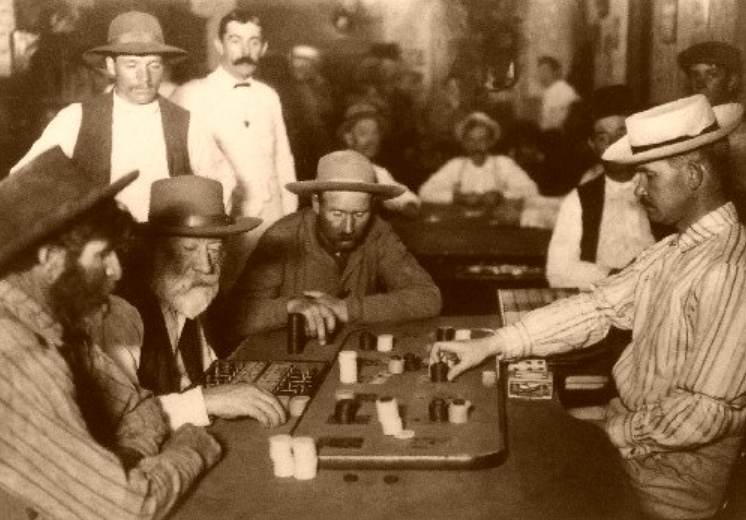Gambling, we’re told, is part of the American tradition. From the lotteries of the American colonies to the riverboats and saloons of the Old West, America grew up on gambling.
For those who learn their history from television, that may seem correct. But is this true?
Yes, gambling has a place in American history – but it is a dark place, a chapter best forgotten. Gambling has waxed and waned in America before. Many see the current surge of gambling as the “third wave” of a plague that keeps coming back.
The First Wave: Colonial America
The first wave took place in the 1700s, when lotteries were often used to finance colleges. But voices rose in opposition. In 1783, George Washington warned his nephew Bushrod Washington:
“[A]void gaming. This is a vice which is productive of every possible evil, equally injurious to the morals and health of its votaries. It is the child of avarice, the brother of iniquity, and father of mischief. It has been the ruin of many worthy families, the loss of many a man’s honor, and the cause of suicide. To all those who enter the list, it is equally fascinating; the successful gamester pushes his good fortune till it is overtaken by a reverse; the losing gamester, in hopes of retrieving past misfortunes, goes on from bad to worse, till, grown desperate, he pushes at everything, and loses his all. In a word, few gain by this abominable practice (the profit, if any, being diffused), while thousands are injured.”
As General of the Army, Washington issued a General Order in 1776 directing that:
“All officers, non-commissioned officers, and soldiers are positively forbidden playing at cards and other games of chance. At this time of public distress, men may find enough to do in the service of their God and their country without abandoning themselves to vice and immorality.”
Because of these and other social evils, gambling was outlawed in most of the eastern states by 1840.
The Second Wave: The Western Frontier
But as the West was settled, gambling experienced a resurgence. Through the riverboats on the Mississippi and the casinos and saloons of the frontier, Hollywood has indelibly impressed gambling upon our consciousness as part of the American experience.
But if gambling is really as American as apple pie, why was it outlawed in every state by 1900?
The answer is that gambling proved to be a national disaster. The United States Justice Department issued a study in 1883 titled Memoranda Concerning the Rise and Decline of the Lottery System, that concluded:
“A faithful account of the rise, progress and decline of the lottery system in the United States will furnish a melancholy chapter in the history of the American people. Few of the present generation [1883] have any adequate conception of the hold upon social and commercial institutions which the lotteries obtained in the first 30 years of this century, of the rapid growth of the gambling spirit engendered by them, of the vast evils resulting from them, which overspread the country, or of that widely extended movement against them, among moral and thoughtful citizens, which culminated, before the end of the half century, in their total suppression in many States and partial suppression in others.”
The United States Supreme Court also recognized the evils of gambling. Focusing upon lotteries, the Court declared in Phalen v. Virginia (1850):
“Experience has shown that the common forms of gambling are comparatively innocuous when placed in contrast with the widespread pestilence of lotteries. The former are confined to a few persons and places, but the latter infests the whole community; it enters every dwelling; it reaches every class; it preys upon the hard earnings of the poor, and it plunders the ignorant and simple.”
And the Court noted in Stone v. Mississippi (1879):
“They [lotteries] are a species of gambling, and wrong in their influences. They disturb the checks and balances of a well-ordered community.
Society built on such a foundation would almost of necessity bring forth a population of speculators and gamblers, living on the expectation of what, ‘by the casting of lots, or by lot, chance or otherwise,’ might be ‘awarded’ to them from the accumulations of others. Certainly, the right to suppress them [lotteries] is governmental, to be exercised at all times by those in power at their discretion.”
The Third Wave: Today?
Yes, Americans have flirted with gambling in the past. Each time, it has been a disaster. Each time, thoughtful and moral persons have worked successfully for its elimination.
Now, in 2024, Americans are in the midst of a third wave of gambling. There is no reason to believe the consequences will be any different.
Ask yourself:
Will gambling make my community or state a better place to live, to work, to raise children?
Is gambling consistent with a Christian conscience and the principles of God’s Word?
More in future columns…
Col. Eidsmoe pastors two churches in rural Alabama, is Professor of Constitutional Law for the Oak Brook College of Law & Government Policy (obcl.edu), and Senior Counsel for the Foundation for Moral Law (morallaw.org). He may be reached for speaking engagements at Eidsmoeja@juno.com. The Foundation may be contacted at (334) 262-1245.
The views and opinions expressed here are those of the author and do not necessarily reflect the policy or position of 1819 News. To comment, please send an email with your name and contact information to Commentary@1819News.com.
Don't miss out! Subscribe to our newsletter and get our top stories every weekday morning.










